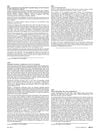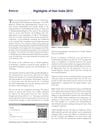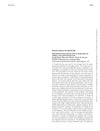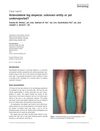 1 citations,
April 2018 in “Revista da Sociedade Portuguesa de Dermatologia e Venereologia”
1 citations,
April 2018 in “Revista da Sociedade Portuguesa de Dermatologia e Venereologia” Hidradenitis suppurativa is a chronic skin condition more common in women, linked to genetics and lifestyle factors, and associated with various other health issues.
 1 citations,
June 2017 in “Skin”
1 citations,
June 2017 in “Skin” Apremilast may help treat lichen planopilaris and frontal fibrosing alopecia when other treatments fail.
 1 citations,
May 2015 in “Journal of The American Academy of Dermatology”
1 citations,
May 2015 in “Journal of The American Academy of Dermatology” Oral clindamycin and rifampicin are the most effective treatments for Folliculitis decalvans.
 1 citations,
January 2012 in “International Journal of Trichology”
1 citations,
January 2012 in “International Journal of Trichology” Hair India 2012 was a successful international event focused on combating fake trichology practices and discussing various hair health topics.
 1 citations,
October 2008 in “Expert Review of Dermatology”
1 citations,
October 2008 in “Expert Review of Dermatology” Frontal Fibrosing Alopecia is a slowly progressing hair loss condition, likely underdiagnosed, with ineffective treatments, needing more research to understand it fully.
 1 citations,
January 2001 in “Dermatologic Surgery”
1 citations,
January 2001 in “Dermatologic Surgery” Pulsed dye laser and hydrogel dressings effectively treat hypertrophic scars.
 August 2024 in “International Journal of Basic & Clinical Pharmacology”
August 2024 in “International Journal of Basic & Clinical Pharmacology” Secretome-based therapies could improve hair growth better than current treatments.
 July 2024 in “Plastic and Aesthetic Research”
July 2024 in “Plastic and Aesthetic Research” Careful planning and accurate diagnosis are crucial for successful hair restoration surgery.
 June 2024 in “British Journal of Dermatology”
June 2024 in “British Journal of Dermatology” Black women with CCCA are more likely to have uterine fibroids.
 June 2024 in “Al- Anbar Medical Journal”
June 2024 in “Al- Anbar Medical Journal” Acute telogen effluvium can be resolved by addressing causes, but chronic telogen effluvium is harder to treat.
May 2024 in “Journal of Fungi” Tinea capitis in adults, especially postmenopausal Black women, needs prompt treatment with oral antifungals to avoid scarring.
 March 2024 in “Dermatology and therapy”
March 2024 in “Dermatology and therapy” AA patients with comorbid conditions face more severe hair loss and need specific treatments.
 March 2024 in “Frontiers in genetics”
March 2024 in “Frontiers in genetics” Different types of fibroblasts play specific roles in wound healing and cancer, which could help improve treatments.

Baricitinib may effectively treat oral lichen planus.
 January 2024 in “International journal of homoeopathic sciences”
January 2024 in “International journal of homoeopathic sciences” Early intervention and patient education are crucial for managing alopecia areata.
 January 2024 in “International Journal of Dermatology Venereology and Leprosy Sciences”
January 2024 in “International Journal of Dermatology Venereology and Leprosy Sciences” Patients with acne vulgaris have lower serum irisin levels.
 December 2023 in “EPRA international journal of multidisciplinary research”
December 2023 in “EPRA international journal of multidisciplinary research” Alopecia areata causes sudden hair loss, has genetic links, and can be managed but not cured.
 October 2023 in “Dermatology practical & conceptual”
October 2023 in “Dermatology practical & conceptual” Many patients experienced hair loss after COVID-19, with women affected more, starting on average 49 days post-infection.
 September 2023 in “medRxiv (Cold Spring Harbor Laboratory)”
September 2023 in “medRxiv (Cold Spring Harbor Laboratory)” Long-COVID has diverse, long-term health impacts, especially in young people.
 August 2023 in “International journal of research in Ayurveda and pharmacy”
August 2023 in “International journal of research in Ayurveda and pharmacy” Garudan Kizhangu Ennai may effectively treat alopecia areata but needs more research to confirm its safety and effectiveness.
 June 2023 in “British journal of dermatology/British journal of dermatology, Supplement”
June 2023 in “British journal of dermatology/British journal of dermatology, Supplement” A 13-year-old boy had both lichen planus and vitiligo, suggesting a possible link between the two conditions.
 January 2023 in “Malaysian Journal of Medical Research”
January 2023 in “Malaysian Journal of Medical Research” Early and proper treatment is crucial for children with allergic conjunctivitis to avoid complications.
 September 2022 in “Skin appendage disorders”
September 2022 in “Skin appendage disorders” Seborrheic dermatitis may contribute to the development of central centrifugal cicatricial alopecia.
 August 2022 in “Frontiers in genetics”
August 2022 in “Frontiers in genetics” A new genetic change in the DSC3 gene is linked to a rare condition causing hair loss and skin blisters in a child.

Early identification of lupus through skin signs and blood tests is crucial in India.
 April 2019 in “The journal of investigative dermatology/Journal of investigative dermatology”
April 2019 in “The journal of investigative dermatology/Journal of investigative dermatology” Targeting cholesterol, fatty acids, fibrosis, and mast cells may help treat CCCA.
 January 2019 in “Medicine Science | International Medical Journal”
January 2019 in “Medicine Science | International Medical Journal” Children with different rheumatologic diseases have specific skin symptoms that can help with diagnosis.
 January 2019 in “Springer eBooks”
January 2019 in “Springer eBooks” Acne is linked to inflammation and insulin resistance, and is associated with various syndromes that require different treatments.
 October 2018 in “InTech eBooks”
October 2018 in “InTech eBooks” The most effective treatments for hair loss are minoxidil, finasteride, PRP, and hair transplants, with steroids and immunosuppressants for autoimmune types.
 September 2018 in “International Journal of Dermatology”
September 2018 in “International Journal of Dermatology” Anterolateral leg alopecia is a benign, nonprogressive hair loss condition on the lower legs that is not well understood and may resolve on its own.




























